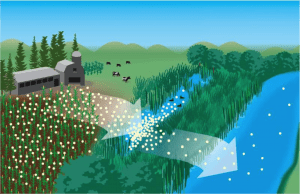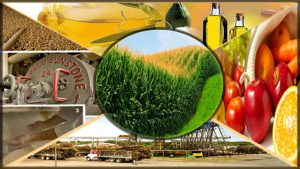Organic farming:
Organic farming is a farming system which is associated with the maintanace of soil health and food quality in such a way, that in this system there is no use of chemicals and its main object is to improve the ecosystem and has no adverse effect on human health. In this system the use of synthetic fertilizers, chemicals and other growth regulators is discouraged and it mainly depends on the use of crop rotations, cover crops, manures (animals and poultry) etc. In organic farming all the inputs are derived from biological means rather than artificial and synthetic means.
Worldwide scenario of organic farming:
According to the world of organic agriculture 2015, the world organic agriculture land is about 43.1 million hectares in 2013 consisting of approximately 0.98 % of total agricultural land, which was 11 million hectares in 1999. And there are 170 countries who are doing certified organic farming worldwide but out of these countries only 82 have regulations for organic agriculture. There are 2 million producers worldwide and the market size is of 72 billion US dollars.
There has been an increase in all the regions of the world with the exception of Latin America. About 75 % of the land under organic agriculture is in developing countries and it is also the emerging market for organic food products. The regions with largest organic agriculture land include Oceania (17.3 million hectares), Europe (11.5 million hectares), Latin America (6.6 million hectares), Asia (3.4 million hectares), north America (3 million hectares) and Africa (1.2 million hectares).
Organic agriculture in Pakistan:
According to IFOAM report, the area under certified organic farming in Pakistan is approximately is 22,397 hectares, majority of which is in KPK. It has a share of 0.1 % in total organic land in the world. It has been stated in the report that the land under organic farming is increasing with the period of time. According to agriculture scientists, Pakistan is on the verge of losing many international markets after the introduction of World Trade Organization (WTO). Pakistan’s main exports of fruit and its products are to Middle East, Sri Lanka and Central Russian States, where the quality standards are not as strict as compared to the developed countries. In recent years the export of Kinnow to European countries is almost equal to zero due to high standards of check and balance. It is due to this that Pakistan has tool steps to introduce Good Agricultural Practices to upgrade its farming standards in line with International standards.
Organic Farming Constraints in Pakistan.
There are a variety of issues which are of huge importance when it comes to have more area under organic farming and some of them are as follows;
Inputs are not easily available It is of great concern for organic producers in Pakistan that the availability of inputs required for the production of organic food is not to the extent that is need for the good organic system to produce more and good quality food. For example, the inputs require for biological weed or insect control are not easily available to small farmers so it is difficult for farmers to produce organic food.
Lack of certification (both inputs and output) In Pakistan there are no such system are organization that are easily approachable by small farmers to have their product labelled as certified. So it is one of the main constraints that is also limiting the area under organic farming.
Absence of Organic Markets Farmers have not any access to sell their organic food because of the non-availability of organic markets, which is indeed a major problem in this aspect. In Pakistan, majority of the farmers are small land holder and they do not tend to take risks. So it is difficult for them to produce a product about which they are not sure that will they get some benefit out of it or not.
Low demand and high pricing: Due to the high prices it is difficult for organic products to make a market in Pakistan because majority of the people of it are not in a condition to afford a high price product.
Low yield as compared to other farming systems: As the population of the world is increasing day by day, it is necessary to have more production per unit area to meet the demand of food for the world population. The UN launched a program in 2008 which conducted a study and survey on organic farming, which concluded that farming by organic methods gives small yields when compared to conventional farming methods. According to Danish Environmental Protection Agency the organic farms which produce potatoes and sugar beet are hardly producing half of the total output produced by conventional farming, in the same area.
Lack of knowledge: One of the major constraints is the lack of knowledge about organic farming. Majority of farmers in Pakistan do not know about the organic farming and its effects on the ecosystem. So it is impossible to increase the area under organic farming without educating the farmers in this aspect.
Lack of government interest and policies: At the moment, the government is absolutely not interested in the well-being of farmers and have not done any fundamental work or have not made policies about agriculture which promote organic farming and are also beneficial for farmers.
Written by.
Jabir Riaz*,Imran Ramzan1, and Asrar Masood3.
Author * & Co- Author1 Department of Agronomy, University of Agriculture Faisalabad
3Department of Soil and Environmental Sciences, University of Agriculture Faisalabad
.
E-mail: [email protected]









Thank you. This article was very helpful in furthering my knowledge about the scope of organic farming in Pakistan. Very informative and well-written.